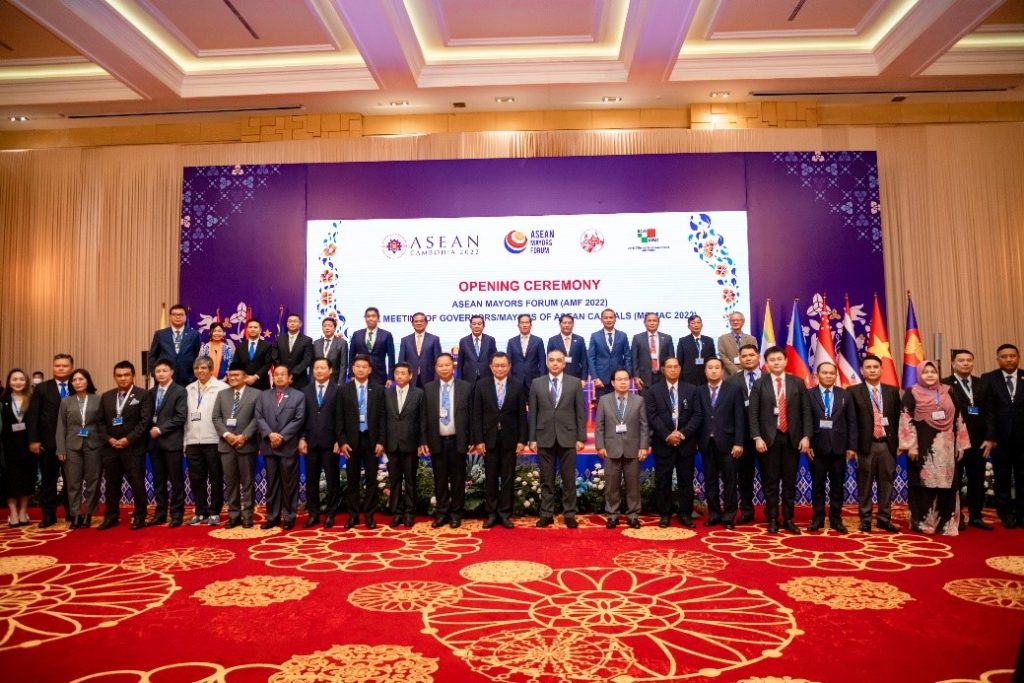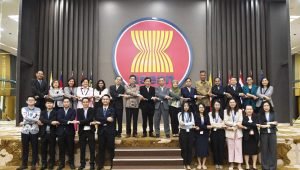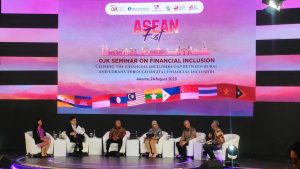December 2-3, 2022 | Since the COVID-19 pandemic, the ASEAN Mayors Forum returned as an offline event held at the Sokha Hotel Phnom Penh & Residence. The United Cities and Local Governments Asia Pacific (UCLG ASPAC) , as the host of AMF Secretariat, co-organised the Forum together with the Phnom Penh Capital Administration as the host city.
In line with Cambodia’s ASEAN Chairmanship, the AMF elaborated on the theme ASEAN A.C.T.: Addressing Challenges Together: “Strengthening ASEAN Collaboration through Accelerating the Implementation of Smart, Resilient, and Sustainable Cities for Transformative Urban Living in the New Normal”. More than three hundred participants, including mayors, governors, and representatives from ASEAN cities and local governments and regional partners participated in the Forum. With the common goal of strengthening cooperation among ASEAN cities, for the first time, the AMF was held together with the Meeting of Governors/Mayors of ASEAN Capitals (MGMAC).
The Prime Minister of Cambodia, His Excellency Samdech Akka Moha Sena Padei Techo Hun Sen, inaugurated the AMF. He acknowledged that cities are hearts of countries and regions and that building smart and green cities with use of digital technology is the accurate direction for the present and future. Prime Minister Hun Sen recommended the following in order to build and connect ASEAN cities: 1) ensure peace, security, stability and prosperity; 2) improve living qualities of the people in terms of well-being, prosperity, and resilience; 3) involve all stakeholders including local governments, private sector, development partners, national and international institutions, especially local people; 4) jointly promote digitalization; and 5) promote culture of exchanging knowledge and sharing experiences in building smart cities. This is the first time that the head of government participated at the AMF.
The Governor of Phnom Penh, Mr. Khuong Sreng, in his opening message, remarked that ASEAN cities face very similar challenges and there is a need to think strategic responses to create a city that is not only resilient but sustainable and smart. Gov. Khuong Sreng stated that “cooperation through sharing of knowledge and experience is more important than ever so we can achieve growth and prosperity for all cities in the region”. He strongly hoped that ASEAN, whether at national or subnational levels, will continue to expand the level of cooperation.
Roundtable discussions were held on the following priority areas for ASEAN cities: sustainable finance, digital governance, localising the SDGs, the launch of the ASEAN Sustainable Urbanisation Report, and urban climate resilient and disaster risk reduction in ASEAN.
Parallel Session 1: “Sustainable Financing for Urban Development”
UNCDF outlined the key directions for public finance of local governments to be sustainable. Panel members generally agreed that source of revenue and budgeting are the keys issue for local governments when implementing their development projects. Local governments need diverse sources of revenue, ranging from efficient tax collection and service fee. Public-private partnership plays a huge role in implementing development projects as it has the potential to increase the tax revenue and can initialise the development projects without the demand of total cost from the local government. Performance-based grant is one of the most effective and transparent tools to manage sub-national authority financing.
Parallel Session 2: Localizing SDGs
Cities in the ASEAN region have been localising the SDGs and accelerating its implementation in the local communities. Local governments in Viet Nam are working on attracting investments for smart city development that can contribute in bolstering trade and export. In Malaysia, COVID-19 has accelerated digital transformation and existing strategies are being assessed in order to move towards recovery. Lack of funding, law enforcement, and limited capacity building are challenges experienced by local governments in Cambodia. The need for proper monitoring and evaluation process was highlighted in order to ensure successful implementation of the SDGs.
Parallel Session 3: Digital Governance
The COVID-19 pandemic spurred digital transformation in the ASEAN region. However, cities from developing countries in ASEAN face the challenges on the state and cost of the digital infrastructure, and people’s capabilities to adopt new technologies. Inclusivity of the transformation must also consider language proficiency and the specific needs of people with disabilities and people from the rural areas.
Parallel Session 4: ASEAN Sustainable Urbanisation
This session hosted the launch the ASEAN Sustainable Urbanisation Report, a publication that enhances knowledge on the current urbanisation trends across the ASEAN region within the ASUS framework, particularly in secondary and intermediate cities, and elaborates linkages between the ASUS and global frameworks such as the SDGs and New Urban Agenda. The session contextualized the findings of the Report through a presentation on the publication contents and rationale and through a panel discussion where representatives from academia, NGO, national and local government shared remarks and experiences to increase knowledge and action for sustainable urbanisation.
Parallel Session 5: Enabling Environment on Urban Climate Resilient and Disaster Risk Reduction
In partnership with Deutsche Gesellschaft für Internationale Zusammenarbeit (GIZ), the United Nations Economic and Social Commission for Asia and the Pacific (UNESCAP), the University of Stuttgart and the TU Dortmund University jointly with implementing partners in five Asia Pacific countries, UCLG ASPAC is implementing the Integrated Urban Climate Action for Low-Carbon and Resilient Cities (Urban-Act) project in China, India, Indonesia, the Philippines, and Thailand. This project aims to improve the Institutional Environment for Climate-Sensitive Urban Development, Evidence-Based and Climate-Sensitive Urban and Spatial Planning, develop project concepts for identified urban climate action investments, and support Knowledge-building Through Regional Networks, Exchanges, and Learning. Based on the above and in line with the Urban-Act Initiative, the hybrid parallel session was organised with the theme “Enabling Environment on Urban Climate Resilient and Disaster Risk Reduction. The session highlighted not only local experiences but also regional and national points of view on the efforts of both national and local governments on urban climate resilience and disaster risk reduction, especially the vertical and horizontal integration can be strengthened from the policy level into action. ASEAN has an important Working Group on Environmentally Sustainable Cities, which is also put as one of the key platforms that addressed particularly two priority programmes on Sustainable Urban Planning, Development, and Implementation and Increasing Climate Resilient and Low Carbon Cities. The ASEAN Agreement on Disaster Management and Emergency Response (AADMER) Work Programme 2021- 2025 emphasised Disaster Risk Reduction & Climate Change Adaptation and it also connects to the Guidebook for Urban Resilience: Building Disaster and Climate Resilient Cities in ASEAN.
As follow-up on the AMF 2022 Phnom Penh, the UCLG ASPAC/AMF Secretariat, in collaboration with the future host city of AMF Indonesia, will hold the AMF 2023 aligned with the ASEAN Chairmanship theme of Indonesia, ASEAN Matters: Epicentrum of Growth. At last, the AMF concluded with the adoption of two outcome documents, the Phnom Penh Declaration for the AMF and the MGMAC which will be submitted to ASEAN Secretariat.


